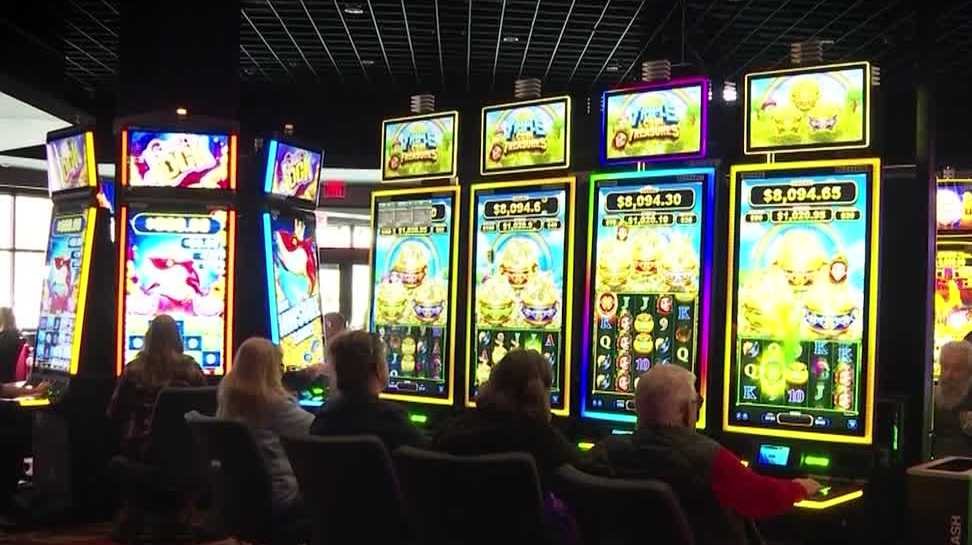## Pixels for a Purpose: Charitable Gaming Booms, But New Hampshire Lags Behind
Imagine a world where your love for gaming could directly impact real lives, where every virtual victory brings tangible benefits to your community. That’s the promise of charitable gaming, a phenomenon that’s raking in millions across the country. But here in New Hampshire, we’re playing catch-up. A new report reveals that while our neighbors are embracing this powerful tool for good, New Hampshire is lagging behind, missing out on a lucrative opportunity to support vital causes and boost local economies.

Blurring the Lines: Examining the Similarities Between Traditional Casinos and Charitable Gaming Venues

Charitable gaming in New Hampshire has exploded in recent years, with establishments now sporting names like “Casinos” and “Lucky Moose,” attracting significant crowds and generating millions for both the state and local charities. This rapid growth has led to scrutiny over the similarities between these venues and traditional casinos, prompting a debate about the nature of gambling and its regulatory framework.
The lines between these two forms of gaming are undeniably blurring. Both offer a variety of gambling options, from slots and electronic table games to poker and bingo. Both generate revenue through player wagers, and both are subject to state regulations and oversight. This raises a crucial question: is there truly a fundamental difference between a traditional casino and a charitable gaming venue?

Lottery Commissioner Charlie McIntyre’s Perspective: Is There Truly a Difference?
Lottery Commissioner Charlie McIntyre, a key figure in regulating New Hampshire’s gaming industry, asserts that the distinction lies more in semantics than substance.
“I’m getting hung up on names. You know what makes a difference between a restaurant and a cafe? I don’t know, a bistro. We call it a gambling room or call it a casino. That’s just the name. The function inside was approved, and it is well and highly regulated.”
McIntyre emphasizes the strict regulations governing both types of establishments, highlighting that charitable gaming venues are subject to the same scrutiny and oversight as traditional casinos. This regulatory framework aims to ensure fair play, protect players, and prevent money laundering, regardless of the name of the establishment.
The Public’s Perception: How Do Players View These Establishments?
While the legal distinction between traditional casinos and charitable gaming venues may be clear, the public’s perception is less straightforward. Many players view these establishments as essentially the same, offering a chance to win money through gambling.
This perception is further reinforced by the names and branding of many charitable gaming venues, which often echo those of traditional casinos. This can lead to confusion and raise questions about the true nature of these establishments.
Understanding the public’s perception is crucial for policymakers and regulators as they navigate the complex landscape of gambling in New Hampshire. Transparency and clear communication are essential for building trust and ensuring that the public understands the differences and similarities between these types of gaming venues.
Out-of-State Influence: Who’s Calling the Shots?
The rapid growth of charitable gaming in New Hampshire has been fueled in part by the involvement of out-of-state companies with deep experience in the gaming industry. These companies bring significant resources, expertise, and operational know-how to the state.
Dominance of Out-of-State Companies
A Gamestanza analysis of state data reveals that five of the 14 currently operating charitable gaming locations in New Hampshire are owned by Peninsula Pacific Group, a California-based gaming company with a national footprint. Two more are owned by EL Entertainment, a Nevada-based company with operations across the country. This concentration of ownership raises questions about the impact of out-of-state influence on the state’s gaming industry.
The Role of Established Gaming Giants
Peninsula Pacific Group and EL Entertainment are both well-established gaming companies with proven track records in operating successful gaming venues. Their experience and expertise are likely to benefit New Hampshire’s industry, providing valuable insights into best practices, marketing strategies, and operational efficiency.
The Potential Advantages and Drawbacks of Outside Ownership
The involvement of out-of-state companies presents both advantages and potential drawbacks for New Hampshire.
- Advantages:
- Access to capital and resources
- Expertise in gaming operations and marketing
- Potential for job creation and economic growth
- Drawbacks:
- Concentration of ownership and potential for market dominance
- Outsourcing of profits and limited local economic benefit
- Influence from corporate interests over local community needs
Looking Ahead: The Future of Charitable Gaming in NH
The future of charitable gaming in New Hampshire appears bright, with projections indicating significant growth potential.
Projected Growth: Can the Industry Reach its Full Potential of $1 Billion?
Lottery Commissioner Charlie McIntyre suggests that the market for charitable gaming in New Hampshire could reach $1 billion. This ambitious goal requires continued expansion, innovation, and a focus on attracting both new and existing players.
The Impact of Limited Licenses: Will the Cap on New Establishments Hinder Growth?
New Hampshire has imposed a cap on the number of charitable gaming licenses, limiting the number of new establishments that can open until 2031. This cap aims to ensure responsible growth and prevent market saturation. However, it also raises concerns about whether it will hinder the industry’s ability to reach its full potential.
Senator D’Allesandro’s Vision: A Lasting Legacy for Charitable Gaming in New Hampshire
Longtime State Senator Lou D’Allesandro, a strong advocate for expanding gaming opportunities in New Hampshire, envisions a lasting legacy for charitable gaming in the state.
“Its charitable giving here to stay. Absolutely. There isn’t anybody that’s going to turn it back.”
D’Allesandro’s confidence reflects the growing popularity of charitable gaming and its significant contribution to both local charities and the state’s coffers. The success of this industry will depend on continued collaboration between state policymakers, gaming operators, and the public, ensuring that it remains a sustainable and beneficial force in New Hampshire.
Conclusion
So, while neighboring states are reaping the rewards of charitable gaming, New Hampshire remains on the sidelines. WMUR’s report highlights the significant financial gains other states are seeing, with millions of dollars pouring into vital social services and community programs. It begs the question: what are we missing out on? The potential for New Hampshire to harness the power of charitable gaming is undeniable, offering not just a financial boost but also a unique platform to engage citizens in supporting causes close to their hearts.
The implications of this decision are far-reaching. Beyond the immediate financial impact, charitable gaming fosters a sense of community and shared responsibility. It empowers individuals to contribute directly to causes they believe in, strengthening the social fabric and driving positive change. By overlooking this opportunity, New Hampshire risks falling behind its peers, leaving valuable resources untapped and potentially hindering its ability to address critical social issues. The future, however, is not set in stone. This report serves as a wake-up call, urging New Hampshire to reconsider its stance and embrace the potential of charitable gaming to build a stronger, more vibrant future for all its citizens.
The time for action is now. Will New Hampshire choose to join the ranks of states actively leveraging the power of charitable gaming to make a real difference, or will it continue to miss out on this vital opportunity? The choice, and its consequences, are in our hands.